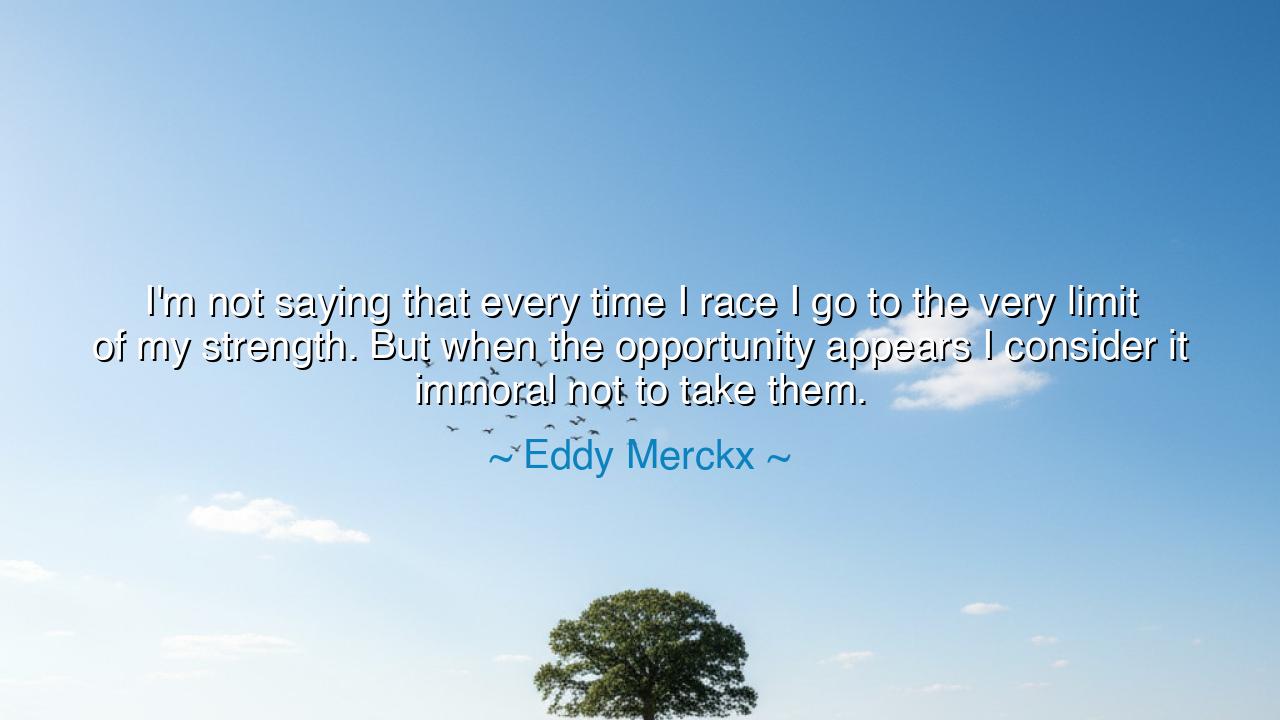
I'm not saying that every time I race I go to the very limit of
I'm not saying that every time I race I go to the very limit of my strength. But when the opportunity appears I consider it immoral not to take them.






Eddy Merckx’s words, “I’m not saying that every time I race I go to the very limit of my strength. But when the opportunity appears I consider it immoral not to take them,” ring with the fiery determination of a man who was not merely an athlete, but a legend of willpower. Known as “The Cannibal” for his relentless pursuit of victory, Merckx here unveils the ethic of the competitor: that one must not squander the rare moments when destiny opens its gates. He admits that not every effort demands total expenditure, but when the chance for greatness appears, it would be dishonorable to withhold one’s full power.
The origin of these words lies in Merckx’s career as one of the greatest cyclists of all time. He raced in an age when the sport demanded not only physical endurance but also tactical brilliance and immense mental toughness. His philosophy was not one of reckless abandon, but of sacred responsibility: that to hold back in the presence of opportunity was not simply a mistake, but a kind of moral failure. He believed that talent and strength, when given, must be used when the moment calls, for to neglect them is to betray both oneself and the calling of the race.
History offers us many examples of this truth. Consider Alexander the Great, who, though often cautious, never shrank back when opportunity presented itself. At the Battle of Gaugamela, facing overwhelming numbers, he seized the moment to lead a decisive cavalry charge directly at the heart of the Persian line. He might have hesitated, conserving his men for another day, but he knew that opportunities of such magnitude come rarely. His boldness reshaped the world. In the same way, Merckx teaches us that when chance opens its hand, hesitation is betrayal.
In a different context, think of Abraham Lincoln, who, though not a soldier in the field, understood the same principle in the realm of politics and justice. When the opportunity came to issue the Emancipation Proclamation, he might have waited, fearing political backlash or military failure. Instead, he recognized that such a moment, once lost, might never return. He took it, and in so doing, altered the moral trajectory of a nation. His action was proof that strength must be applied fully when opportunity arrives.
Merckx’s words also reveal the tension between endurance and timing. A wise man does not empty his strength at every moment; he conserves, he waits, he endures. Yet he also remains vigilant, prepared for the instant when a decisive strike can alter the course of the race—or of life. To waste one’s power on trivial pursuits is folly, but to hold back when the moment of destiny appears is cowardice. The balance between restraint and boldness is the mark of greatness.
For us who hear this teaching, the lesson is clear: do not spend your life in idleness, nor scatter your energies recklessly. But when you see the door of opportunity swing open—whether in work, in love, in service, or in courage—do not hold back. Pour out your full strength, for such moments do not return. The immoral act is not in failing, but in refusing to try when fate calls your name.
The practical action is this: cultivate endurance for the long journey, but keep your heart ready to give everything when opportunity demands it. Do not excuse hesitation with the thought that another chance will come, for some opportunities are once in a lifetime. Train yourself to recognize them, and when they appear, act with courage. In this way, your life will bear the mark of one who honored both the gift of strength and the sacredness of the moments when it must be spent.
Thus, Eddy Merckx’s wisdom is passed down not only to cyclists, but to all who strive: the measure of your life is not how often you preserve your strength, but how completely you give it when the hour of destiny arrives.






AAdministratorAdministrator
Welcome, honored guests. Please leave a comment, we will respond soon